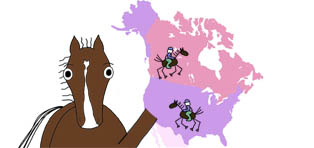AVMA.org
October 26 2011
Most equine veterinarians, at least those who are American Association of Equine Practitioners members, work with nonracing performance horses during their years of training and competition. These animals compete in a wide range of athletic activities encompassing everything from rodeo to dressage to endurance riding.
To better assist its members, the AAEP has developed guidelines for veterinarians who treat horses competing in athletic events other than racing. The document, "Clinical Guidelines for Veterinarians Treating the Non-Racing Performance Horse," promotes medical practices the AAEP believes place the appropriate emphasis on the health, safety, and welfare of performance horses.
Focusing on the highly competitive performance horse environment, the guidelines address the importance of obtaining a specific diagnosis before administering treatment.
"The current use of medications to manage competition horses is often permissive and excessive. This environment is propagated by owners, trainers, and veterinarians who fail to appreciate the potential harm to the horse inherent in the excessive or frivolous use of multiple medications and supplements in the quest for competitive success," according to the guidelines.
All medical treatment of performance horses should be based on a veterinary diagnosis with appropriate time allowed for an evaluation following treatment to ensure the horse has recovered before it competes again, the guidelines go on to say. Administering joint injections without a specific medical indication is listed as an example of underdiagnosis and overtreatment. The competition schedule should not be the primary factor when evaluating a horse's need for medical care, the guidelines contend.
In addition to medication administration, the document addresses the use of shockwave therapy, acupuncture, chiropractic, and cold therapy. Also included are recommendations for veterinary medical records, drug compounding, and infectious disease control at competitions and sales. The guidelines will be updated as research provides new data about the medical care of performance horses.
The clinical guidelines were developed by the AAEP Task Force on Medication in the Non-Racing Performance Horse, a group composed of private and regulatory veterinarians involved in a wide range of sport horse disciplines. Dr. Nathaniel A. White II, AAEP immediate past president, served as task force chair.
"While the guidelines were written for veterinarians, we hope our recommendations will resonate with owners, trainers, and organizations involved with competitions," explained Dr. White in a Sept. 19 AAEP press release. "Everyone involved in the care of the horse must appreciate the potential harm that may come from the excessive use of multiple medications. Simply giving a horse time off from competition is often the best medical choice that can be made."
The clinical guidelines are at www.aaep.org/white_papers.htm .

No comments:
Post a Comment